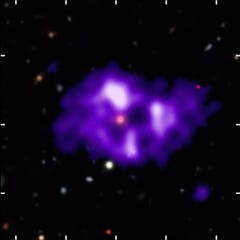
Articles on Astrophysics
Displaying 21 - 40 of 215 articles

Controlled experiments are impossible in astronomy, as are direct measurements of physical properties of objects outside our solar system. So how do astronomers know so much about them?

The gravitational field can affect space and time: the stronger gravity is, the slower time moves. This prediction of General Relativity can be used to reveal hidden forces acting on dark matter.

Measuring the ages of planets and stars is tricky. An observational astrophysicist describes the subtle clues that provide good estimates for how old different space objects are.

Massive flashes of energy known as ‘fast radio bursts’ have puzzled astronomers for years – and a new search for links to gravitational waves has so far found no connection.

Black holes are known for pulling in all kinds of stuff – including light. Here’s how that actually works.

To detect dark matter, you need to build an ultra-sensitive detector and put it somewhere ultra-quiet. For one physics collaboration, that place is almost a mile under Lead, S.D.

Bright, flickering galaxies called quasars were thought to pose a problem for our understanding of the cosmos – but new research shows Einstein was right yet again.

Astronomers have for the first time detected the background hum of gravitational waves likely caused by merging black holes.

Neutrinos are some of nature’s most elusive particles, but new research has used them to create an image of our own galaxy.

The planet Halla looks like it should have been devoured by its host star, a red giant called Baekdu – but a secret in the star’s past may hold the answer to the planet’s present.

Radiation from the brightest cosmic explosion ever seen may have been mixing with gas and dust around its dying star – making the signal last longer.

One of the few examples of a fast radio burst and the slow-moving, star forming gas in its origin galaxy has been linked together – thanks to observations from a CSIRO telescope.

Upgrades to the hardware and software of the advanced observatory should allow astrophysicists to detect much fainter gravitational waves than before.

Stars begin to expand when they run out of fuel and can become thousands of times larger, consuming any planets in the way. For the first time, astronomers have witnessed one such event.

The current race to the Moon is opening up opportunities for lunar astronomy.

Machine learning is becoming an indispensable tool in astronomy by sorting through enormous datasets from telescopes.

Beyond just looking at black holes, the next-generation Event Horizon Telescope collaboration is the first to bring together perspectives from across the sciences and humanities.

Some physicists think we live in a multiverse, surrounded by universes not quite like our own. What does that mean for life?

The discovery of massive, early galaxies could force scientists to rethink how the first galaxies formed after the Big Bang.

Astronomers have found that mysterious dark energy may originate in black holes.
